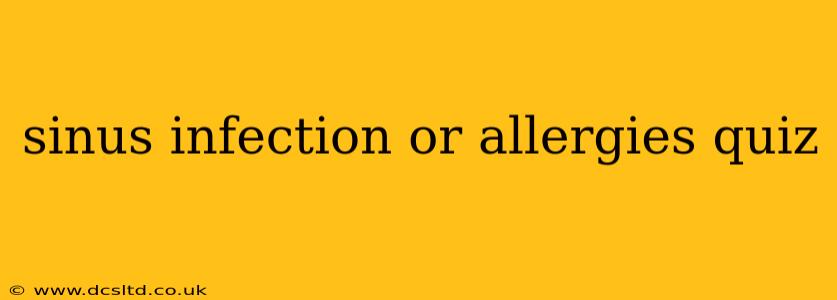Are you suffering from a stuffy nose, headaches, and facial pressure? It's frustrating to feel unwell, and distinguishing between a sinus infection (sinusitis) and allergies can be tricky. Both conditions share similar symptoms, making self-diagnosis difficult. This quiz will help you identify potential causes and guide you towards appropriate care. Remember, this quiz is for informational purposes only and should not replace a consultation with a doctor. Always seek professional medical advice for diagnosis and treatment.
Understanding the Differences: Sinus Infection vs. Allergies
Before we begin, let's briefly review the key distinctions between these common ailments. Sinus infections are typically caused by bacterial or viral infections, while allergies are triggered by an immune response to allergens like pollen, dust mites, or pet dander. While symptoms overlap, there are some crucial differences that can help you differentiate between the two.
Let's Start the Quiz!
Answer the following questions to the best of your ability.
1. How long have you been experiencing symptoms?
a) Less than a week b) 1-4 weeks c) More than 4 weeks
2. What are your primary symptoms? (Select all that apply)
a) Nasal congestion b) Runny nose c) Postnasal drip d) Facial pain or pressure e) Headache f) Cough g) Fever h) Fatigue i) Itchy eyes, nose, or throat j) Sneezing
3. Is your nasal discharge thick or thin?
a) Thick, yellow, or green b) Thin, clear or watery
4. Do you have any known allergies?
a) Yes b) No
5. Have you recently been exposed to someone with a cold or flu?
a) Yes b) No
Interpreting Your Results
Now, let's analyze your answers. There's no definitive "pass" or "fail," as symptoms can overlap. However, certain combinations of answers point more strongly toward one diagnosis than the other.
More Likely a Sinus Infection: If you answered:
- Question 1: b or c (symptoms lasting more than a week)
- Question 2: d, g (facial pain/pressure, fever) predominantly, along with a and b
- Question 3: a (thick, yellow, or green discharge)
More Likely Allergies: If you answered:
- Question 1: a (symptoms lasting less than a week)
- Question 2: i, j (itchy eyes/nose/throat, sneezing) prominently, along with a, b, and c
- Question 3: b (thin, clear, or watery discharge)
- Question 4: a (known allergies)
Symptoms Overlap: If your symptoms blend features from both categories, or if your symptoms are severe or persist, it's crucial to see a doctor for a proper diagnosis and personalized treatment.
Frequently Asked Questions
What are the best home remedies for sinus infections?
While home remedies can provide temporary relief, they are not a cure for sinus infections. Strategies like drinking plenty of fluids, using a humidifier, and applying warm compresses can help manage symptoms. However, persistent or severe sinus infections often require medical intervention, such as antibiotics.
What are the best home remedies for allergies?
Similar to sinus infections, home remedies offer symptomatic relief but not a cure. Over-the-counter antihistamines, nasal sprays (saline or steroid-based), and avoiding allergens can help manage allergy symptoms. If symptoms are severe or persistent, consulting an allergist is recommended.
When should I see a doctor for sinus problems?
You should consult a doctor if your symptoms last longer than 10 days without improvement, are accompanied by a high fever, or if you experience severe facial pain, difficulty breathing, or other concerning symptoms. Children should also be seen by a doctor sooner for similar symptoms.
How are sinus infections diagnosed?
Diagnosis typically involves a physical examination and a review of your symptoms. Imaging tests, such as X-rays or CT scans, may be used in some cases to rule out complications or assess the severity of the infection.
How are allergies diagnosed?
Allergies are often diagnosed through a combination of reviewing symptoms, a physical examination, and allergy testing, which might involve skin prick tests or blood tests to identify specific allergens.
This quiz is intended to provide general information only and does not constitute medical advice. It is essential to seek professional medical advice from a doctor or other qualified healthcare provider for any questions about your health or before making any decisions related to your health or treatment.
